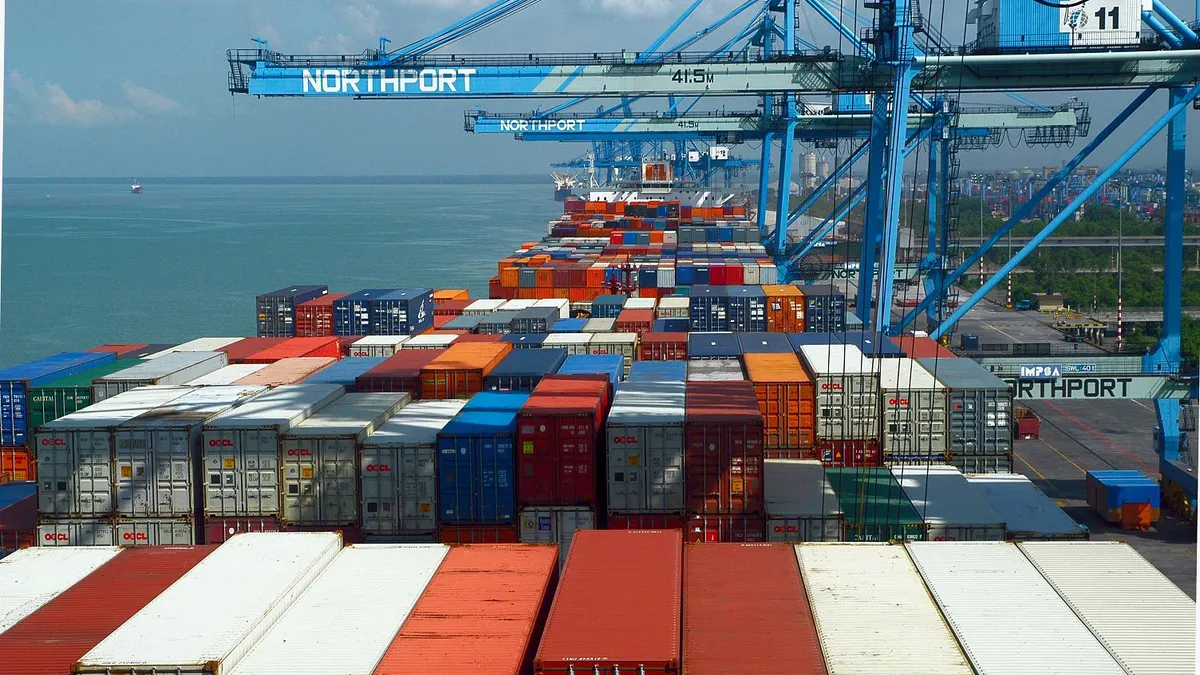UPDATE Nov. 1, 2018: Malaysia recently announced plans for a complete ban on plastic imports within three years, as reported by Reuters and the New Straits Times. During that time frame, clean material will only be allowed from the U.S., European Union and Japan, and an import levy will be charged.
According to a report from the China Scrap Plastics Association, detailed by Plastics Recycling Update, Malaysian importers will also have to phase out their use of foreign material in the meantime. Starting the first year, at least 30% of plastic must be sourced domestically. That increases to 40% in the second year and 50% in the third. Though, like in China, there is some question of whether domestic collection and processing infrastructure can be ramped up quickly enough to make the country self-sufficient.
Dive Brief:
- Leaders in Malaysia have decided to impose an import tax on scrap plastics, according to the New Straits Times and others. After Oct. 23, a tax approximately the equivalent of $3.65 per metric ton will be tacked on to plastic imports instead of the current model of Malaysian processors importing the materials for free.
- The government is also tightening requirements for Malaysian processors to obtain operating permits. The government will collect the names of all companies importing and exporting plastics to check the businesses' legitimacy, and processors will have to get approval from the Malaysian Investment Development Authority (MIDA). MIDA will check with the customs authority to determine the ports' capacity to receive new material before issuing operating permits.
- The government is also intensifying its search for illegal processors, and will be shutting down at least 24 operations soon.
Dive Insight:
Over the summer, Malaysia revoked import licenses for 114 plastic scrap processors and implemented new regulations for obtaining a license. Leaders had indicated the measure was temporary — expiring in October — and that permanent measures likely would follow.
Malaysia and some nearby Southeast Asian countries have become overwhelmed with an influx of materials from around the world since China implemented tighter scrap regulations and material bans. These smaller countries do not have the capacity to process all of the material that China previously handled, overwhelming their ports which at times became littered with stockpiled scrap. Leaders from the countries repeatedly have said they are now the "dumping ground" for the world's waste and recyclable materials.
As a result, Thailand banned 400 types of electronic scrap and promised to ban all plastics in the next two years. Vietnam stopped issuing new licenses for scrap imports, and Indonesia implemented a 100% pre-shipment inspection policy for fiber imports.
In addition to capacity issues, the governments are worried about the environment because they have received more reports of serious pollution from processing facilities, most notably illegal operations that have popped up to handle the surplus. Many of these operations reportedly employ unsafe processing practices and dump or burn materials they cannot handle.
Malaysia's regulatory actions reportedly were prompted to a great extent by the desire to stop several dozen of these illegal operations. A news report from Radio New Zealand released in the last week indicated that multiple plastic sites are hidden in palm oil plantations, and the report asserted they dump contaminated water into the environment in addition to emitting toxic smoke. Reports suggest that many of the illegal operations are owned by Chinese businesspeople who are looking for new outlets now that their own country has cracked down on scrap to such a degree. Just as in Thailand, officials in Malaysia have significantly stepped up inspections this year and even have performed raids and shut down illegal processors.
The news report about illegal operations also highlighted the role other countries' scrap suppliers play in contributing to illegal processing operations. Those who divert their scrap from China to other Southeast Asian countries aren't necessarily checking the legitimacy of the operations they sell to and the increased attention will likely result in greater scrutiny for scrap shipments. This could possibly even include new measures to shift more responsibility for exporters to verify that their materials are ending up with legal processors.
















